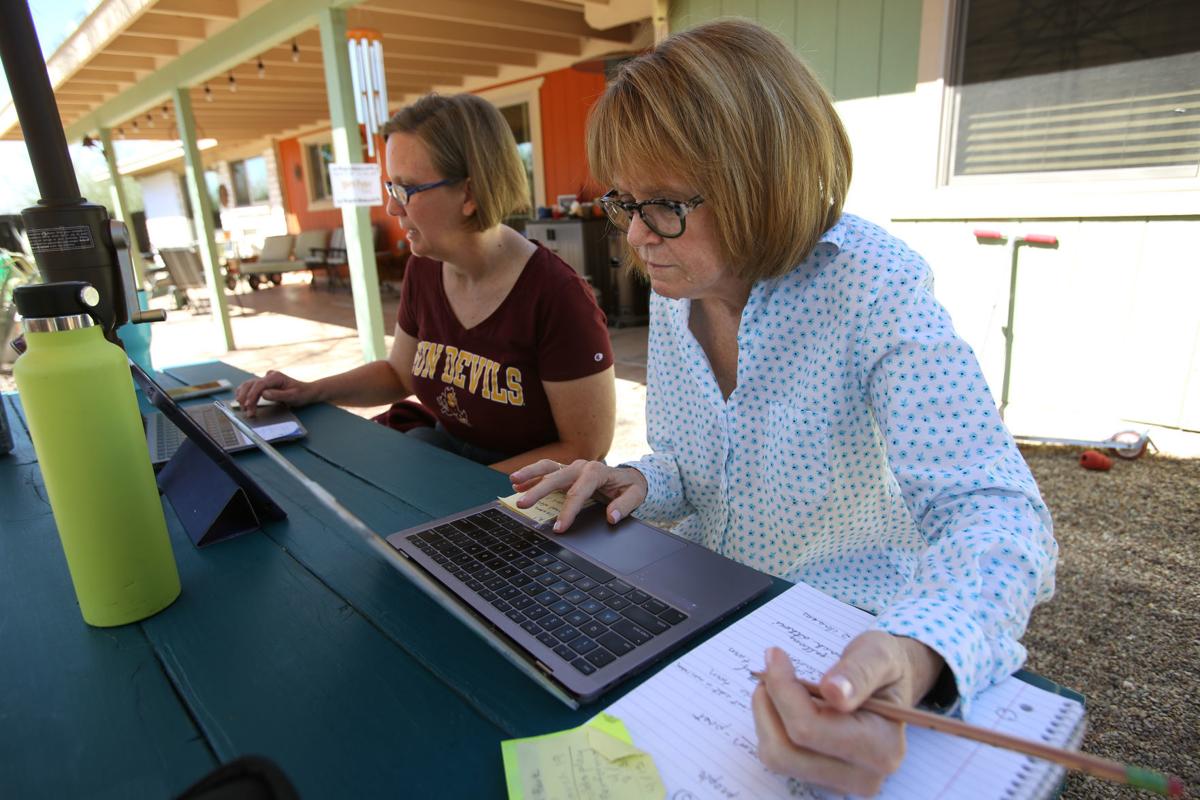School is over for the rest of the year, at least in the traditional sense.
Arizona Gov. Doug Ducey and Kathy Hoffman, the state superintendent of public instruction, announced Monday that due to the continued spread of the coronavirus, there was no reasonable way to have schools reopen safely this spring.
Despite the campus closures, schools are expected to continue offering remote learning opportunities in compliance with plans approved earlier this month by state lawmakers, Hoffman said. School districts have been carrying out that mandate through online instruction and providing paper packets to students as needed.
But Hoffman conceded that this will not make up for actually having the state’s 1.1 million public school students in classrooms.
Hoffman also said the state Board of Education will meet Tuesday to figure out exactly what happens next. That includes everything from the A through F grades given to schools to graduation and promotion requirements.
What it also will include, she said, is how students document what they have learned remotely.
Hoffman said, though, she is under no illusion that all students have the same chance to learn, citing in particular the shortage of laptop computers and even remote “hot spots” — devices to link computers to the internet — for students to be able to connect online.
In some ways, the decision to keep school doors shut is not a surprise. In fact, Rep. Michelle Udall, R-Mesa, crafted legislation in anticipation.
That measure suspends state laws that require there be a certain number of school days and instructional hours. It also canceled the annual statewide achievement tests.
Tucson’s largest school district, TUSD, was already planning for a long-term closure, said Superintendent Gabriel Trujillo.
“We would have opted to be closed for the year,” he said. “We have a community that is terrified. We have a workforce that is terrified. And it’s the right thing to do under these circumstances to keep the district in a state of closure.”
Most significantly, the legislation requires public schools to offer education services in “alternative formats” to continue to receive the state aid. Schools then could continue paying employees to work from home or perform alternative assignments through the end of the school year.
At a press briefing Monday, Hoffman said some school districts are being creative.
She said teachers in the Agua Fria Union High School District in western Maricopa County are conducting lessons using a program called Google Classroom, holding online office hours and developing online lesson plans.
The Marana Unified School District launched its “Learning at Home” program on Monday after distributing Chromebooks to students and families who requested one.
“As we transition from the classroom to home, we do so with the commitment to stay connected and to ensure that the needs of our students and families are met to the best of our ability,” said Marana Schools Superintendent Doug Wilson in a statement.
And Hoffman said more than 545 schools throughout the state are preparing free breakfast and lunch that can be delivered.
“But there are major gaps in access to the technology that students and families need in order to continue the learning process online,” she said. “Many families simply do not have the resources, causing a high demand for devices including laptops and hot spots.”
“It’s much larger than I could have imagined,” she said of the gaps in technology. “It’s probably over 100,000 students, at a minimum, who don’t have the technology at home.”
And fixing it with money isn’t a simple solution.
“Laptops and hot spots are on back order because the entire country has been shifting to telecommuting,” Hoffman said. And she said she has made pleas to Arizona business leaders, as well as colleges and universities, for extra laptops.
“So this is a very serious issue,” she said. “This crisis will worsen many of the inequities that have long existed across our system and that have for years widened the achievement gap between under-resourced communities and their more advantaged counterparts.”
At a meeting on March 27, the TUSD governing board approved $3.5 million in emergency funding to purchase and deploy Chromebooks, complete with internet access, to nearly 18,000 families who lack the resources to participate in online instructions, Trujillo said.
“It is a monumental challenge that’s never been attempted on this kind of a scale anywhere in Southern Arizona,” he said. “We have 18,000 families that are cut off from any kind of education opportunities right now, and it’s all hands on deck to change that as quickly as we can.”
After surveying families, TUSD estimated it needed to distribute 23,500 devices to students and 650 to teachers, of which the district already has 10,000. The district plans to distribute Chromebooks over the next four to five weeks, with teachers and high school seniors having priority.
While students without access wait for devices, they will receive student workbooks and regular check-ins from teachers.
“It’s a race against this digital divide,” Trujillo said.
Hoffman also said there also are separate issues of serving students with disabilities who, whether due to physical or cognitive impairments, cannot access online learning even if they had the equipment.
Hoffman said the immediate focus has been on working on online learning for the balance of this school year as well as the question of high school graduation, the issue the Board of Education will take up Tuesday. But she acknowledged there’s also the issue of the academic credentials of students in other grades and whether they will be prepared to enter the next grade when schools reopen in the fall.
“We’ve been convening groups of superintendents and charter leaders to talk about that, to talk about what does this look like,” she said.




